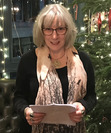Paula R.C. Readman's Blog, page 59
December 20, 2020
Clubhouse Guest’s Chat: Jeff Warren
Welcome to Clubhouse Chat page. Those of you who are not a member won’t be aware that the location of the Clubhouse is shrouded in mystery. The only way to visit it is via membership or an invite to the tearoom. Every few days, I’ll be sharing a conversation with all sort of writers and authors at different levels of their writing careers. Over tea and cakes, or maybe a glass of something stronger, I shall be chatting with my guest about their work in progress, or latest book release.

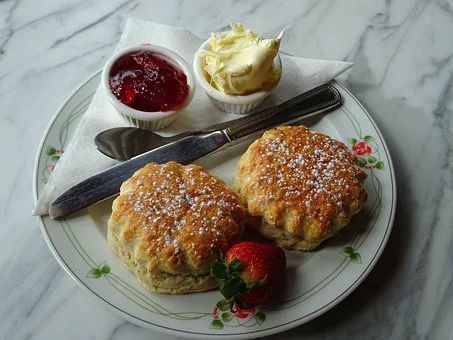
Today I’m chatting to Jeff Warren. Welcome to the tearoom, Jeff. My first question to all my guests is what would you like to drink?
Thank you for the invite to your tearoom. The cream teas look delicious along with a cake stand stacked full of sandwiches, and cakes. Could I have some scones with lashings of clotted cream and strawberry jam! I prefer Assam tea, if it’s available?
Of course it is. Right now our refreshments have arrived could you begin by tell us a little about your latest writing project. Is it a new idea, or one you have been mulling over for some time?
In recent years I’ve been reading crime novels set in Scotland, Yorkshire and the Fens, but I noticed that there aren’t many set in Wales. I know Pembrokeshire well as I visited its coast on family holidays as a child and, years later, I met and married a nurse who was born near Milford Haven.
I decided that a small coastal community would make a great setting for a series. The first of my Pembrokeshire murder mysteries, ‘A Final Regret:’, was published in November. It’s a ‘family-friendly’ read. There’s little or no graphic violence, gory detail, swearing or explicit sex.
I’m currently writing Book 2. Sgt Alys Carey and DI Matt Vincent will be investigating yet more murders in this otherwise peaceful corner of Wales.
 Jeff Warren
Jeff Warren
Choosing only five of your favourite authors. Can you list them in order 1 begin the top of your list and say how have they influenced your writing?
I’ll have to say Rosemary Sutcliff, Dick Francis, Ian Rankin, Peter Robinson and LJ Ross, although that is more a chronological order than anything else. I’ve excluded all of the action adventure and historical fiction authors that have influenced me too.
The Eagle of The Ninth by Rosemary Sutcliff was the first book that I can specifically remember reading. I was about 9 years old at the time. It’s an adventure quest story set in Roman Britain. More recently I’ve moved over to police procedurals including Ian Rankin’s Inspector Rebus, Peter Robinson’s DCI Banks and LJ Ross’s is DCI Ryan novels.
Were any of your characters inspired by real people?
The setting for ‘A Final Regret’ is Pembrokeshire, where my wife was born and raised and where we were married. We’ve returned every summer to visit my wife’s relatives and childhood friends. There’s a much stronger sense of community there than where we live now. It’s inevitable that some members of the local community have coloured my character’s descriptions and behaviours.
My wife’s aunt and uncle ran a hotel in the area and I helped in the hotel’s kitchen when their chef unexpectedly fell ill one summer, so some of the characters are loosely based on the hotel staff I worked with back then. I’ve also taught in colleges not dissimilar to the one portrayed in the story.
What did you learn when writing your book? In writing it, how much research did you do?
I love research and I’ll happily spend hours seeking out background information on every aspect of my stories. I cringe when I read other authors’ work and they blatantly get their facts wrong.
For my latest novel I visited the websites of the local police force, historical societies, hotels and tourist sites, the Welsh government and county council, I even walked the Pembrokeshire Coast Path on Google Street View. I enjoy subtly weaving my findings into both plots and descriptions to enhance the realism of my stories.
Is there anything about you your readers might be surprised to find out?
Five years ago my wife and I joined Surrey Show Choirs. We sing songs from the musicals and we’ve performed at Disneyland Paris, the Edinburgh Fringe, at country shows and in theatres, about a hundred performances in total. We’ve even sung to Robbie Williams and Susan Lampard in the Loose Women studios! Some of our best experiences have been backing professional performances by ‘Beyond the Barricade’ and ‘Tenors Un Limited’. It’s brought an unexpected and new dimension to our lives.
What is your work schedule like when you’re writing?
I don’t really have a fixed work schedule. I fit in as much writing as I can around the other activities in my life. If I really want to push the word count, I’ll write every day of the week. Ideally I’d like to make writing a regular nine-to-five commitment, but I’m unable to do that.
Do you set yourself a daily word count?
Not really. 2000 words a day is the maximum I can usually manage. I’m not a fast writer for two main reasons. I’m not somebody who can just sit down at a keyboard and start writing straight away. It takes me a while to get into the required mindset. I envy those authors who can dash off a few paragraphs whenever they have ten minutes to spare. Also I polish my work as I write. Much of what I write in the first draft will make it through to the final story. I’m reluctant to edit what I’ve written. But hey, 2000 words a day isn’t bad.
Did you ever consider writing under a pseudonym?
It’s confusing to readers if they see that you write in different genres, which is why J.K. Rowling of Harry Potter fame writes her adult novels as Robert Galbraith.
If I had the time and upped my productivity, I’d write crime, action adventure and historical fiction using three different pseudonyms. I can’t see that happening. Life is too busy.

How do you select the names of your characters? Do you know everything about them before you start writing their story?
I choose the names of my characters to match the story setting, so many of my characters in ‘A Final Regret’ have Welsh forenames or surnames, or names that wouldn’t feel out of place in that corner of Wales.
I recently read a book where two characters had very similar names, and I constantly had a problem working out which character was which. I don’t want my readers to be distracted by such annoying irrelevancies. To avoid that I enter my character names in a spreadsheet and steer clear of similar forenames and surnames. I also check that my villains’ names and occupations don’t match those of real people in the area – I told you that I’m a glutton for research!
I certainly don’t know everything about my characters before I start writing. Their personalities evolve as I write. Characters also pop up to fill gaps in the plot as I write, so they definitely have to grow as the story progresses.
What was your hardest scene to write?
For me it’s always hardest writing a concluding chapter to round the story off after the climax and denouement. Readers want a satisfying ending that ties up the loose ends, but you need to leave a hook if the novel is part of a series. For me the worst types of ending are the ones that don’t actually finish the story, or that are a list of what happened to each of the main and supporting characters. I’m hoping that my epilogue to ‘A Final Regret’ will leave my readers feeling satisfied with a smile on their faces and a desire to read more.
How long on average does it take you to write a book?
As I’ve only completed two full length novels and the first sat on the shelf for a long time before I went back to finish it, I’m not admitting to my average. Suffice it to say that my latest novel took a year from inception to publication. I’m aiming for half that time for its sequel, and that will have to include writing, editing, marketing and publishing. I hope I’m not holding myself a hostage to fortune. Watch this space, as they say!
Thank you for our chat, Jeff. If you would like to find more about Jeff’s writing and books please click on the link to his Amazon Author’s page:
If you want to find out more about Clubhouse Member’s Books don’t forget to check out the Clubhouse Bookshops too.
December 18, 2020
Clubhouse Guest’s Chat: Brandon Scott
Welcome to Clubhouse Chat page. Those of you who are not a member won’t be aware that the location of the Clubhouse is shrouded in mystery. The only way to visit it is via membership or an invite to the tearoom. Every few days, I’ll be sharing a conversation with all sort of writers and authors at different levels of their writing careers. Over tea and cakes, or maybe a glass of something stronger, I shall be chatting with my guest about their work in progress, or latest book release.


Today I’m chatting to Brandon Scott about his writing and books. Welcome Brandon. My first question to all my guest is what would they like to drink? So what would you like?
Wild Strawberry Tea, Please, and thank you for the interview.
Now we have our refreshments let’s start with what writing elements do you think is your strongest points, and what would you like to do better?
As long as I’m not overthinking it, because I may forget how I do it, but pacing has always been something I could do without much thought put into it. It’s one of the things I get complemented on the most. The other thing would be dialogue. I’ve been able to write how people talk pretty effectively…so I’ve been told, but I’m still learning. Now, what I can’t do all that well is keep tenses straight in narration. I switch tenses up constantly and my editor goes nuts over it all the time.
Tell us a little about latest writing project. Is it a new idea, or one you have been mulling over for some time?
My newest project is the third book in the ‘Vodou’ series. I’ve just finished with Jr. edits and am starting the final read through before it goes to senior editing at my publisher.
The first book follows a grim reaper deep-fried Cajun named Jack Holiday. Book 2, called ‘Sleight’ follows a magician named Zadok Mitchem. Both book 1 & 2 happen at the same time, coming to a head at the end of book 3. The books are steeped in the mysticism of Voodoo lore. So far the series has been well received.
How many unfinished projects do you have on your computer?
Around 30, I wanna say with nearly 20 that have significant work done to them. I’ve estimated I have between 10-12 years of planned work ahead of me.
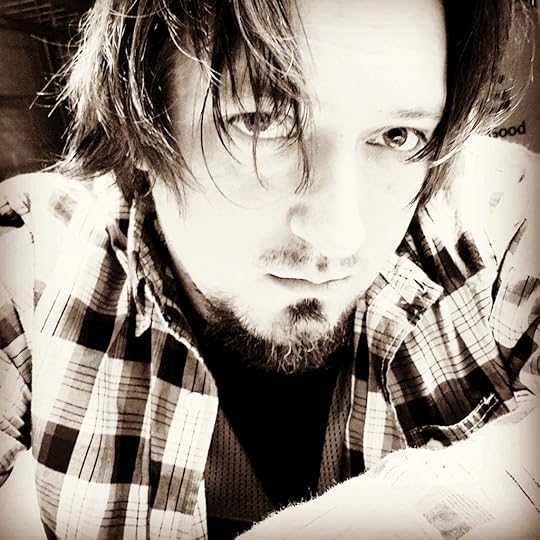 Brandon Scott
Brandon Scott
Do you write a synopsis first or write the first chapter, or let the characters lead you?
In the beginning. I write little snippets on post it notes or in a steno pad. Sometimes whole chapters (if I’m lucky) and most of the time the thoughts come out of order with the story line.
When I sit down, I usually have the first chapter sketched out and I just go with it. I hate outlines, in a series they are kina necessary to keep the arc together, but I’m not much of a plotter or I’m no good at it. I tend to make a hit list of points I would like the characters to get to and if they don’t get to them all, then that’s ok. I feel I’m at the mercy of the character, not the other way around and I’ve found my characters don’t react well to being restrained in an outline.
When reading your work through do you ever find that your daily mood swings are reflected in your writing.
I know when I’m tired, it comes through when I’m feeling ‘meh’ and the writing is ‘meh’. I try to not write when angry or super stressed. The lack of focus that comes with those situations really pours through into the work. I like a good neutral mood, not too happy and not malcontent. I find a middle of the road calm works best for me.
Were any of your characters inspired by real people?
Yes. Without the two hitchhikers I saw on the side of the on-ramp of I-40 in the middle of the night, ‘Vodou’ would have not existed and Jack Holiday along with it. Also, Jack’s way of speaking is based on a friend I had many years ago, he was displaced when Katrina tore through New Orleans, so he ended up here in mountain of North Carolina and after awhile he blended the two dialects of Cajun and Hick to a unique way of speaking. That individualized dialect became Jack’s voice in my head. He wouldn’t be half as well drawn of a dude without it.
What is your work schedule like when you’re writing? Do you set yourself a daily word count? How many hours in a day do you write?
Everyday. I write six hours a day, Monday-Friday, after the day job from 5pm-11pm. Saturday and Sunday are the same hours but skewed to 9am-3 or 4pm. I try to not shut down until I reach 1,500 words or so, which is tough on the first draft as I write it out in long hand. I use a different fountain pen everyday that is armed with a different color ink for that day. It’s a handy way to keep track of your progress day to day. From experience doing this, it seems Wednesday is the roughest day to get anything accomplished.

Did you ever consider writing under a pseudonym?
Well Brandon Scott is a pen name of sorts as it’s my first and middle name. My last name has too many clunky sounds to flow, so it was agreed that I would use Scott, but I do have a pen name on stand-by complete with an origin story.
How do you select the names of your characters? Do you know everything about them before you start writing their story?
I have a little book I have dubbed the book of names. I go into cemeteries, newer and older…the older the better quality of unique names, ex. Zadok came off a tombstone from an 1814 death day. While I’m there I work sections, taking down the first names, working in a descending circular pattern, until I reach the “center”. Once there, I back track the circle jotting down last names at the top of the list to get a mix so it’s not direct dictation of the gravestones. A perk to this method of gathering names is the feeling that you’re giving the people attached to the name a new life in the fiction.
How long on average does it take you to write a book?
Close to a year, mostly because of my drafting process. First draft by hand. Second draft is complete dictation to the computer with minimal changes. Third draft is a hardcopy print off so I can do manual mark ups. Fourth draft is another print off…and the process continues until the fifth draft, which is now the beta copy. When I get that back, I run another hard copy (everything is done from hardcopy…I’m very low tech, I know…) then it’s off to Jr. edits (a new thing I’m doing and a needed thing) the draft that follows is a copy and paste, making the changes that are there.
The last draft before subbing it to the publisher for senior editing is a hardcopy run off that is read aloud to a tape recorder (I hate my voice!) and only then will it go to senior editing…just to still get it all wrong.
Thank you for our chat, Brandon. To find out more about Brandon’s writing and books click on this link: Brandon’s Amazon Page:
If you want to find out more about Clubhouse Member’s Books don’t forget to check out the Clubhouse Bookshops too.
December 17, 2020
Clubhouse Guest’s Chat: Molly-Jaye Kirchner
Welcome to Clubhouse Chat page. Those of you who are not a member won’t be aware that the location of the Clubhouse is shrouded in mystery. The only way to visit it is via membership or an invite to the tearoom. Every few days, I’ll be sharing a conversation with all sort of writers and authors at different levels of their writing careers. Over tea and cakes, or maybe a glass of something stronger, I shall be chatting with my guest about their work in progress, or latest book release.

Today I’m chatting with Molly-Jaye about her writing and books. Welcome Molly-Jaye and my first question to you is what beverage would like?
Well, there two on my favourite list either Cabernet Sauvignon, or maybe Chocolate Raspberry iced coffee, no cream or sugar.
As our driver Brutus will be run you home would you like a Cabernet Sauvignon.
Oh, please and I get a ride home too?
Yes, of course we like to make sure our guests get home safely. Let’s start by asking you what writing elements do you think is your strongest points, and what would you like to do better?
I feel very comfortable with dialogue. I believe this is because when I write it’s like a movie playing in my brain. I see it, I hear the characters. I can type out a conversation with ease. Sadly, it’s the description that gets me every time- especially action. I recognize my telling versus showing. I try to stay on top of this while writing and during my self-editing, but it is my most crippling writing issue in my opinion.
Tell us a little about latest writing project. Is it a new idea, or one you have been mulling over for some time?
I started THE ALVAH a million years ago! I wish that was a lie, but every time I think of it the old lady from Titanic pops into my mind claiming, “It’s been 84 years …” and that’s how it feels lol. I tend to write quickly. I can bust out 5000+ words in a sitting if the environment is right. I want to say I started this novel and completed it in 2017. Originally the second to last chapter was the first, I offered the reader nothing until the end, and my first batch of beta readers hated it! It’s come a long way: 2 professional edits, 6 amazing beta readers, and so many self-edits I lost count. I feel like the work I’ve put into it has taught me so much about writing, the process, and what to watch for my next book. So, it WAS a new idea … in 2017, that I’ve mulled over for 3 years!
How many unfinished projects do you have on your computer?
Currently, I have 3 completed novels on my computer that collect dust, one WIP that I’m editing and querying, and about four files with maybe a chapter or two that I just lost interest in. I keep everything I write. I was a finalist in a school contest for writing back in … er, we can leave the year out. The lady in charge told us on day one: “Never get rid of anything you write, even if it’s on the back of a receipt. Save it! Keep it forever! Ten years from now, you may come across it and it may spark the greatest thing you’ll ever write.” I took that to heart. I have a trunk in my office with EVERYTHING I’ve ever written. One day, I hope her advice brings about my bestseller … or when I’m long gone, someone will open that trunk and think I was insane lol!
 Molly-Jaye Kirchner
Molly-Jaye Kirchner
Do you write a synopsis first or write the first chapter or let the characters lead you?
I just write. I never worry about the story, the direction, anything. I let the characters drag me through, for sure. I never question a thing that comes out on a first draft. If I plan too far ahead, my creative process is hindered and my brain cramps. I generally go scene-by-scene. I tend to drive around aimlessly for an hour or so, or hide in my office, listening to very specific music that puts me in the mood of my main character. An annoying habit that affects my husband greatly, but while writing something I have to listen to specific music the entire time I’m working on a specific book. Music keeps my mind focused and my thoughts centered in the world I’ve created. Once my characters are settled, the story starts to form and I just go into more scenes from there.
When reading your work through do you ever find that your daily mood swings are reflected in your writing?
Absolutely! And I know which days I CAN AND CANNOT write based on this. I know this sounds bad, but I tend to write best when I’m a little down. I find that writing from a sad place allows for more emotions to come out in my words. If I’m angry, I’m actually garbage! And of course, I can be happy, but if I cross over into that giddy, omigod, life is perfect, everything is great happiness, then I’m too distracted and nothing comes out.
Were any of your characters inspired by real people?
Most of my characters take on the look of people in my life, but not the actual people themselves. Many people think the main character in THE ALVAH is me. And yes, her looks are similar, but no, she is in fact her own person. I just really want to bring body-types like my own into focus. I’m tired of the perfect female protagonist. My work is generally female-driven and they are mostly short, curvy types- not thin enough to be skinny, not large enough to be plus-sized. I will admit I pull stories from my friends and family and often include them in back stories. It’s like adding my own, personal Easter eggs and I love them … the people they’re inspired by are not always happy lol.

Is there anything about you your readers might be surprised to find out?
I think there’s a lot about me that my reader doesn’t know. Even in my social media presence, I’m not sure people truly “get” me. I tend to be light-hearted; I joke a lot. In “real life,” I’m very sarcastic and I cuss ALL THE TIME lol. Although these are all aspects to my personality, I like to leave people guessing. If you only see me as the former, you’ll probably wonder if I actually wrote THE ALVAH. It’s dark and twisty and at times, frightening. I grew up enamored by horror, sci-fi, and true crime. If I’m being honest, I’m still obsessed with these genres. In fact, my dogs are named after horror film actresses (Betsy Palmer and Piper Laurie … Cruella de Vil is the cat’s name). In my youth, I read a lot of Christopher Pike books- he was my favorite, and yes, we are friends on social media, and yes, I totally messaged him once and he responded (let me believe this, though it was probably an admin lol). I’m not sure my readers can tell that about me from interaction, but I hope they will enjoy that in my book.
What is your work schedule like when you’re writing?
I’m a night owl. I always have been. At night, after my husband goes to bed (taking our two Great Danes with him), my cat comes out and joins me. I call it “Mama-Kitty Time.” I pull out the computer, play the correlating music, and just write. I’d say between the hours of 11 pm and 1 am, I am solidly working. If I can grab some time in the afternoon, I will, but I generally do edits during the day because I’m too easily distracted. My job as an esthetician allows me to set my own hours and days so I always make sure to start later in the morning or afternoon, giving me just enough sleep for my late night hours of work.
Do you set yourself a daily word count?
No. I’m very anti-box. What I mean by that is I believe placing boxes over yourself, your craft, hinders your creative process. If I set goals and don’t meet them, I would beat myself up. Plus, I don’t believe a specific word count should ever be a goal. I could throw out 2k words, but if they mean nothing, if they are just filler to meet said accomplishment then all I have is 2k worth of trash in a file. I write until my fingers hurt from a long day, until my brain is too tired, or until I have the bones of a scene that may need to be fleshed out later.
Did you ever consider writing under a pseudonym?
I actually have one. Prior to THE ALVAH (soon-to-be published by Darkstroke), I self-published a picture book series under a pseudonym. What some might not know is that I have the longest name in human history (thanks, Mom lol). I actually created my pseudonym from pulling out of my own name. Are you ready for this sneeze? My birth name is Molly-Jaye McKitrick Kirchner (this is where you say “God bless you” lol). And no, that doesn’t include my married name. I still question how I learned to spell this as a young child. So, my pseudonym is “Jaye McKitrick” and I wrote four picture books under the title THE MESSY WORLD OF LITTLE MISS MOLLY. Yes, these are based on my childhood and they tell little life lessons. It started out as an adult project because I always say “my life is so messy”- not literally, I’m actually quite clean, but definitely figuratively. For our honeymoon, my husband and I stayed home, pretty broke from our wedding, and I asked him if he wanted to help me with this project. I wrote the books and drew the pictures. He then took my pencil drawings and created them as graphics so I always give him illustrator credit. He’s a very talented artist and his ability with graphic design is amazing – far better than what I forced him to work on. To this day, he says I’m the worst boss he’s ever had lol.
Thank you for joining me in the tearoom, Molly-Jaye. The link for Molly-Jaye’s mybook.to/thealvah*It’s available for pre-order now and releases on February 3, 2021 on amazon for print and kindle
If you want to find out more about Clubhouse Member’s Books don’t forget to check out the Clubhouse Bookshops too.
December 16, 2020
Are you looking for something dark to read?
You might want to read gothic whydunnit crime novel. Artist James Ravencroft is passionate about his art. Just a little too passionate. To capture the real beauty of his models they have to remain still.
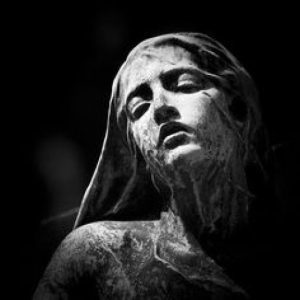
#CrimeFiction #horrorfiction @darkstrokedark

Clubhouse Guest’s Chat: Jilly L Bowling
Welcome to Clubhouse Chat page. Those of you who are not a member won’t be aware that the location of the Clubhouse is shrouded in mystery. The only way to visit it is via membership or an invite to the tearoom. Every few days, I’ll be sharing a conversation with all sort of writers and authors at different levels of their writing careers. Over tea and cakes, or maybe a glass of something stronger, I shall be chatting with my guest about their work in progress, or latest book release.

Today my guest in the tearoom is the poet Jilly L Bowling. Welcome, Jill. My first question to you is what would you like to drink?
Thank you, for the invite. Oh, please could I have tea, thank you, and those cakes to look nice.
Of course, you may. Now our refreshments have arrived let’s start by asking you when you first begun your writing journey what drew you to your chosen genre?
Ok Paula, well I grew up in a farm house on the moorlands in Lancashire, and there were so many things around me that helped led me down the path of writing poetry, I was 12 when I wrote my first poem, I was actually sat in the churchyard in a place called Haworth in Yorkshire. So as stated in my book there was plenty of things, I grew up around that gave me ideas for poetry.
Tell us a little about latest writing project. Is it a new idea, or one you have been mulling over for some time?
My first book of poetry, well it had been in the pipeline for a few years, planning saving up to be able to pay for printing and everything else that came with it. So yes, it’s been thought about for a while now. Also, all the proceeds are being donated to a Children’s and young adult’s hospice who I support here in Hampshire where I live. Sales are going really good had so much support from many people some I know and some I don’t.
 The lovely poet Jilly L Bowling
The lovely poet Jilly L Bowling
How many unfinished projects do you have on your computer?
Oh, now you’re asking Paula, well I have my second book on my computer that will be out next year, I am also planning something else for next year which is in blue print at the moment.
Were any of your characters inspired by real people?
Yes, many of my poems are actually about real people I know, knew and experienced life around, if they read them, they will probably know they are within the pages of a book forever more. LOL

Is there anything about you your readers might be surprised to find out?
Oh, quite a few things, not a lot of people know about me, I once worked as a security guard and I was also in the Police Force for just under 10 years as a constable with Greater Manchester Police Force. I am also a Psychic medium; I see dead people as the film goes but I don’t work in the public eye on that one.
How long on average does it take you to write a poem?
That’s a tough one Paula, because I can write 2-3 poems a day from 5-8 verses, so I once I begin that first verse the words just begin to flow.
What did you learn when writing your poem? In writing it, how much research did you do?
The thing is when I am writing my poems, I find with some of the words it can take you back to a different era, I have researched a few things for one or two of my poems not much mind only enough to make the poem work.
Do you write any sort of plan write poetry, or do you just go with the flow?
I don’t plan poems they just gain entry into my head. Whatever I am writing about be it a real life subject that occurred, or a real life experience. Some people have actually said, when reading some of my poetry it actually take them back to a time they can remember, which I think is great. If you can transport a reader to a long gone era, and they enjoy what they’ve read then my job is done.
Do you set yourself a daily word count?
I don’t think I do, Paula I just start typing and just let those words flow. If I’m sat there all day, or just a few hours and I end up with a few poems than I am happy with what I’ve done for the day.
When reading your work through do you ever find that your daily mood swings are reflected in your writing?
This is actually a true thing, Paula, because many of poems can be emotional. I feel that how one feels at the time of writing does reflect within the words, and as you read them back it really does give the poem a mood of its own. No two poems feel the same when you read them, well I don’t think so anyway.
Thank you so much for joining me today, Jill. When you are ready to leave please let our driver Brutus know and he will run you home.
To find out more about Jill’s writing please check out her twitter account at: Jilly L Bowling @BowlingJilly
If you want to find out more about Clubhouse Member’s Books don’t forget to check out the Clubhouse Bookshops too.
What a morning!
It all started with a dentist appointment. Gosh, the parking had me running in circles. Drove to Iceland 
December 15, 2020
Clubhouse Guest’s Chat: Mark Ellis
Welcome to Clubhouse Chat page. Those of you who are not a member won’t be aware that the location of the Clubhouse is shrouded in mystery. The only way to visit it is via membership or an invite to the tearoom. Every few days, I’ll be sharing a conversation with all sort of writers and authors at different levels of their writing careers. Over tea and cakes, or maybe a glass of something stronger, I shall be chatting with my guest about their work in progress, or latest book release.

Today I’m chatting to Mark about his writing and books. Welcome to the tearoom, Mark. Let’s order our drinks first. What would you like?
Thanks for inviting me for tea, Paula. Oh yes. Please could I have a tomato juice. I’m not much of a hot drink person.
Of course you may. Now we have our refreshment let me start by asking you when you first began writing journey what drew you to you chosen genre?
I write about a London police detective, Chief Inspector Frank Merlin, who operates in World War 2 London. I love history and have always wanted to write historical fiction. I suppose I chose World War 2 because the war had loomed large in my life. My father died when I was only seven, the victim of a long-term wasting disease contracted on wartime naval service in West Africa. I was much-influenced too by my mother’s fascinating wartime tales of watching bombed Swansea burning from her back garden in Llanelli, and of travelling up to London by train on weekends to go dancing with her friends regardless of the dangers of the Blitz.
Tell us about your latest writing project?
I am currently completing the first draft of my next Frank Merlin book, the fifth in the series, which will be published by Headline Accent next year. It is set in August 1942. I am gradually working my way through the war. My first book, Princes Gate, is set in January 1940, the second, Stalin’s Gold in September 1940. Merlin 3,Merlin At War, takes place in July 1941, and the last published, A Death In Mayfair, in December 1941. The good thing about a historical series is that you have an overall framework.
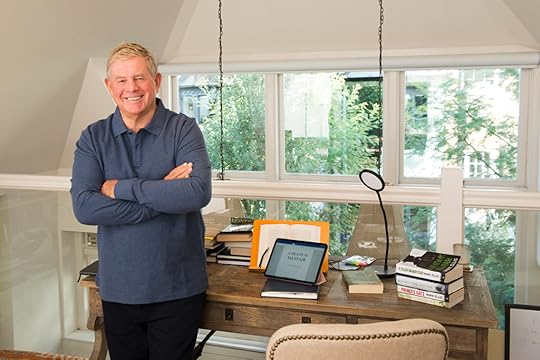 The fascinating Mark Ellis
The fascinating Mark Ellis
Do you write a synopsis first or the first chapter?
I write the first chapter. I never work out what happens in my books in advance of writing. I have my chosen period and a rough idea of plot background, then just get going and see what happens. With my last book, for example, the period setting was December 1941, the month of Pearl Harbour, and I knew that I wanted a plot background of the wartime film industry.
Can you name your top five favourite authors, and tell us how they have influenced your writing?
Georges Simenon – simple, clear prose.
Patricia Highsmith – the value of fascinating villains.
Charles Dickens – characterisation.
John Buchan – pacing.
Graham Greene – atmosphere.
Are any of your characters inspired by real people?
Physically Frank Merlin bears a resemblance to my father, who was tall, lean and dark. In A Death In Mayfair, several of the characters bear a resemblance to real film people eg Rex Harrison, Sir Alexander Korda, George Formby, Sam Spiegel. My books also feature real characters as themselves. Churchill, Stalin, Goering, De Gaulle, Ribbentrop and King George the Sixth are among those to make an appearance so far.
What did you learn when writing your book? How much research did you have to do?
I learned that the trick is in the editing. I regard writing a book as a little like sculpture except the writer has to create the raw material in the first place ie the first draft. Once that is complete it’s a question of chipping away.The first draft of my last book went through 26 edits.
Before every book I spend about 3 months researching the exact period. I have built up a very good personal library of WW2 histories, diaries and novels and immerse myself in these or other relevant online or public library material before I start to write.
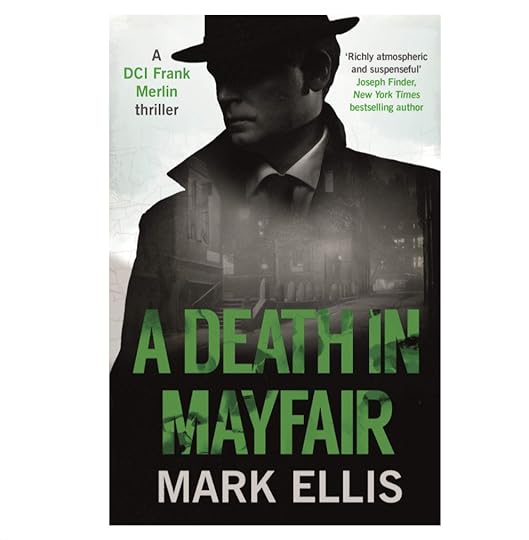
Can you tell us anything about yourself which the readers might find surprising?
In the 1990s I co-founded a computer services company which my partner and I took public on the NASDAQ exchange in America.
What’s your writing work schedule?
I start writing every weekday at around 9.30 to 10. I have a daily word target of at least 1,500. I work until about one when I break off to go to the gym or have a bike ride. A late lunch follows, then I go back to the desk until around 5.30 or 6. My afternoon work tends to be oriented more to research or correction. I think I am more creative in the morning. I try not to write at weekends but sometimes needs must.
Have you ever considered writing under a pseudonym?
Not really. After my first book was published under my own name, I was surprised to discover that there was another writer called Mark Ellis, although funnily enough that is his pseudonym. Luckily we don’t work in the same space. He is an American writer of comic books. I suppose if at some point I were to take a completely different writing direction and move away from crime fiction, I might consider a pseudonym.

How long does it take you to write a book?
18 to 24 months. I have speeded up a little. The first couple of books took longer. I’d love to get the period down further but am not sure I can. I have great admiration for those authors who can deliver a book or more a year.
Thank you for our chat, Mark. When you are ready to leave just let Brutus know and he will run you home. If you would like to know more about Mark’s writing and books please check out the links below.
Mark’s author website: https://markellisauthor.com
Mark’s Amazon Author’s Page:
If you want to find out more about Clubhouse Member’s Books don’t forget to check out the Clubhouse Bookshops too.
December 14, 2020
Clubhouse Guest’s Chat: Karen Crowson
Welcome to Clubhouse Chat page. Those of you who are not a member won’t be aware that the location of the Clubhouse is shrouded in mystery. The only way to visit it is via membership or an invite to the tearoom. Every few days, I’ll be sharing a conversation with all sort of writers and authors at different levels of their writing careers. Over tea and cakes, or maybe a glass of something stronger, I shall be chatting with my guest about their work in progress, or latest book release.

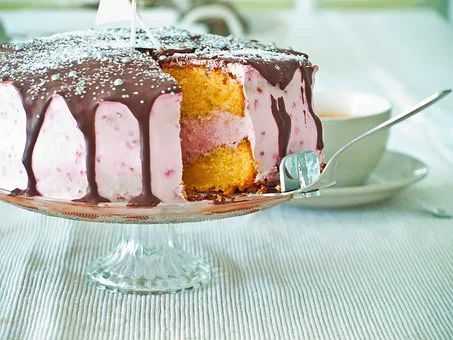
Today I’m chatting to the poet Karen about her writing and books. Welcome to the tearoom, Karen.
Thank you so much for inviting me over for tea, Paula.
Now we have our refreshments can I start by asking you how long on average does it take you to write a poem?
Anywhere from five to ten minutes. Poetry is easy for me when it comes to the traditional style but it would take me much longer… Hmm, I do apologize but I must try a slice of this lovely looking Victoria sandwich. Oh yes, that’s lovely. So, yes, as I was saying, it would take me much longer to write a poem in other styles, especially complicated styles.
Tell me a little about your latest writing project. Is it a new idea, or one you have been mulling over for some time?
You must try this earl grey tea sometime. It’s wonderful. Ah yes, my latest project. Well, presently I am also a freelancer and so I’ve been researching the histories of small communities in the surrounding area of where I live and the local paper runs the articles. I’ve been doing this for about a year now and my plan is to eventually compile enough of these articles into a book. It will be a historical non-fiction book with articles on old mining towns in Idaho.
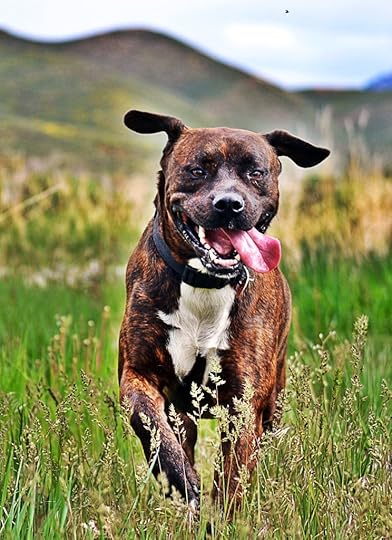 Harper Anderson aka Karen Crowson (Alvin)
Harper Anderson aka Karen Crowson (Alvin)
Did you ever consider writing under a pseudonym?
Funny you should ask. As you can see I look nothing like the photo I gave you so yes, I did consider it and decided to do so. Harper Anderson isn’t my real name but I will tell you the name of the beautiful boy in the photo. His name is Alvin and he is my boxmas and I assure you he is quite happy to be the face of Harper Anderson. The only issue is he requires a raise of extra biscuits each time his identity is revealed. It’s in our pawtract.
Is there anything about you your readers might be surprised to find out?
Well I’m not sure how to top revealing that I am indeed not a dog but since the aim here is to surprise I guess I could reveal that I do indeed feed Alvin leftovers and play the harmonica for him. Alvin is musically inclined and really has his howl down wonderfully.
What is your work schedule like when you’re writing?
Oh, it’s absolutely chaotic. I have this ability to get tunnel vision and so once I start writing, I cannot stop and I absolutely abhor being interrupted. The reason I say it’s chaotic is because I am usually surrounded by papers, or worse, multiple stacks of papers, especially if I am researching. I’ll forget to eat sometimes if I’m really in the zone but once I am in that zone it is very difficult for me to see or concentrate on anything else.
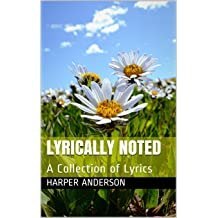
Do you set yourself a daily word count?
No, but I do wish to be more of a structured writer at some point. I wear many hats besides being a freelancer and author so I’m usually juggling many things at once. Some days I can pump out 3,000 words easy peezy while other days I may not even touch a pen.
When reading your work through, do you ever find that your daily mood swings are reflected in your writing?
Absolutely not. My job as a writer is to tell the story and while much of me and my mind goes into the story, I do not push my own biased emotions onto the characters or stories. This is especially true with my freelance work. I tell the facts and only the facts, not my opinion or someone else’s opinion nor do I use words to manipulate the reader into a certain narrative I wish to be pushed. I don’t believe in that. That is terrible journalism. However, this is also why I enjoy poetry because through poetry I feel I can truly express my emotions and so yes, in reading my own poetry I can very clearly see what my emotions were at that time. On that note, I think I’ll have one more slice of that Victorian sandwich.
Do you plan your poems or let the poems lead you?
The poems always lead. Every time. I can be making a cup of coffee or walking to the post office and the words of the first four lines will usually come racing into my mind and I will start scrambling for a pen but lately I’ve realized it’s easier to just turn my camera on and start recording and I’ll go back later and write them down. If I hit a weird slump when I can feel the energy ceasing…well, I’ve been known to throw a poem together from multiple unfinished poems or two to three lines I’ve written on various scrap papers from other brain hits in the past.
Were any of your poems inspired by real people?
Maybe I should change this tea out for something stronger. Yes, I would say over half of the poetry I have written has been inspired one way or another by a real person or someone I knew. The remaining poetry is pure imagination or based off historical events.
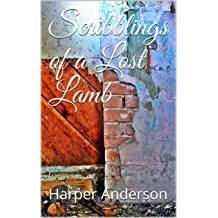
Did you uncover things about yourself while writing poetry?
Yes, writing has always been very therapeutic for me so while in the moment I may not experience self realizations, it is later in re-reading my poetry that I gain insight into my most inner self. If I weren’t a writer, I wouldn’t mind working in the field of psychology. A person’s mind is a fascinating place.
Thank you so much for joining me, Karen. If you would like to know more about Karen’s writing and books please check the links below.
Amazon Author Page with Books by Harper Anderson: https://www.amazon.com/Harper-Anderson/e/B07GX2RFLL/ref=dp_byline_cont_pop_ebooks_1
Author Harper Anderson Facebook Page: https://www.facebook.com/harperandersonauthor
Sins of an Old Soul Purchase https://www.amazon.com/gp/product/B07GKWJMWS/ref=dbs_a_def_rwt_bibl_vppi_i4
If you want to find out more about Clubhouse Member’s Books don’t forget to check out the Clubhouse Bookshops too.
December 13, 2020
Clubhouse Guest’s Chat: Paula Williams
Welcome to Clubhouse Chat page. Those of you who are not a member won’t be aware that the location of the Clubhouse is shrouded in mystery. The only way to visit it is via membership or an invite to the tearoom. Every few days, I’ll be sharing a conversation with all sort of writers and authors at different levels of their writing careers. Over tea and cakes, or maybe a glass of something stronger, I shall be chatting with my guest about their work in progress, or latest book release.

Today, I’ve invited Paula to the tearoom to talk about her writing and books. Welcome Paula. What would you like to drink?
Thank for the invite Paula. My favourite beverage is tea. My work is fuelled by it and I get through gallons. I like it very weak (my dad used to call it gnat’s pee!) with a dash of milk and no sugar.
Now we have our refreshment may I ask you when you first begun your writing journey what drew you to your chosen genre?
I began my journey writing short stories and serials for women’s magazines, back in day when almost every magazine had a fiction page. Sadly, no longer the case. I found the stories I enjoyed writing most were the ‘Twist in the Tail’ type, ie when the writer deliberately misleads the reader by laying false clues in among the real ones.
These sold really well for quite a few years but I realised that the technique is almost exactly the same for writing the type of ‘whodunnit’ crime stories that I so enjoy reading. So I turned to crime which proved very popular and several of the serials I wrote for women’s magazines have since ‘grown up’ into full length novels. In fact, my MyWinchmoor series (and I’m now on #4) started life as a 2 part, 8k word serial in Woman’s Weekly. Almost 4 books and 300k words later and it’s still going.
What writing elements do you think is your strongest points, and what would you like to do better?
My strong point is definitely humour. And my weakness is planning. I am also absolutely rubbish at writing (a) graphic violence and (b) sex scenes, which is a bit of a handicap given that I write mostly murder mysteries spiked with humour and sprinkled with romance. (No graphic sex or violence though!
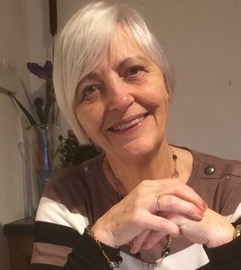 The Wonderful Paula Williams
The Wonderful Paula Williams
Tell us a little about latest writing project. Is it a new idea, or one you have been mulling over for some time?
Murder on High is the fourth in my Much Winchmoor murder mystery series. They’re set in a Somerset village that bears a startling resemblance to the one in which I live! Although as far as I know none of my friends and neighbours have murderous tendencies.
I love writing this series but have got myself in a bit of a quandary trying to work out if my main character, Kat, really is going to leave the village that is stifling her or settle down and marry the gorgeous Will, a local farmer who’s as much a part of Much Winchmoor as the village pond (although, according to Kat, he smells a lot nicer). And the appearance of a softly spoken, good looking Irishman is not helping matters! I really have no idea how it’s all going to turn out.
How many unfinished projects do you have on your computer?
I don’t think I would dare count them. Although most of them date from when I used to write (and sell) short stories for the womags. After writing literally hundreds of them (over many years) I learned which were going to work and which were not and many of them did not make it past the first draft stage. Maybe I’ll go back and revisit them one day. Who knows?
Do you write a synopsis first or write the first chapter, or let the characters lead you?
Like I said, I’m not that good at the planning thing, which is a bit of a handicap when you’re writing murder mysteries and have to be careful about who is where and why. Only last week, I found I had to rework an entire thread because I’d got one character in two places at the same time. Then there was the problem of another character’s precious blanket, stolen from a washing line on a day that I’d already decided would be one of continuous rain.
The one thing I do have in mind very clearly when I start a new book though is what I call The Three Ms. I know who the Murderer is, his/her Motivation and the murder Method. It works for me!

When reading your work through do you ever find that your daily mood swings are reflected in your writing?
No. Once I am in writing mode, I am in that world and leave the real world behind. That’s what I love about writing. I believe it’s the best therapy in the world, this the ability to create a world you can control when the real world is spinning out of kilter – which it seems to be doing an awful lot of at the moment!
Were any of your characters inspired by real people?
I am one of six children and once wrote a short story that was almost true to life. It was very much written as a tribute to my dad and I was so proud of it that when it was published I bought 5 extra copies of the magazine to give to my siblings. Four of them totally ‘got it’ and loved it. The fifth, however, read it, sniffed and commented “Well, that was money for old rope, wasn’t it?”
Guess who ended up in my next murder story, when I needed a victim? Strangled by ‘an old rope’, of course!
How many hours in a day do you write?
I aim to stay at my desk for three hours a day but I am having to force myself to spend some of that time on the marketing side of the business. That’s my resolution for 2021, to get better at social media and marketing. The writing is the easy (and fun) part of the business. The marketing, not so much.
Did you ever consider writing under a pseudonym?
Not now because I’ve been writing for 12 years and have established my name. But I wish when I’d started out I’d used my maiden name which was Gingell. (A) because it’s unusual and (B) because it comes nicely towards the start of the alphabet, unlike Williams which is close to the end.
How do you select the names of your characters? Do you know everything about them before you start writing their story?
I take ages finding the right names for my characters. It is more a question of “I don’t know what it is but I’ll know it when I see it.”
I sometimes use the names of places I come across when travelling. For example, there’s a village we pass through on the way to our son’s called North Bradley and I named a character Bradley North. It really suited him. Then I was stuck in traffic once by the junction of two roads, one was Hempitt Lane and the other Mildred Close. My character became Mildred Hempitt. I was very fond of her and was sorry when she came to an untimely end.
One odd thing, though. Two of my favourite names are Kate and Rob and they appear frequently in my stories. But it was only recently that it occurred to me that my parents’ names were Robert and Kathleen. I wonder what Freud would have made of that!
I don’t know everything about my characters but add to them as I go along. One of the hardest things about writing a series is keeping the characters consistent over time. I keep a file for each but don’t update as often as I should. Thank you so much, Paula, for letting me joining you in this lovely tearoom.
Thank you for joining me, Paula. If you would like to find out more about Paula’s writing and books please click on the links below.
Paula’s website and blog is at paulawilliamswriter.com
The links to her books are https://mybook.to/murderservedcold
https://mybook.to/roughanddeadly https://mybook.to/buryingbadnews
If you want to find out more about Clubhouse Member’s Books don’t forget to check out the Clubhouse Bookshops too.
December 12, 2020
Clubhouse Guest’s Chat: Juliet Greenwood
Welcome to Clubhouse Chat page. Those of you who are not a member won’t be aware that the location of the Clubhouse is shrouded in mystery. The only way to visit it is via membership or an invite to the tearoom. Every few days, I’ll be sharing a conversation with all sort of writers and authors at different levels of their writing careers. Over tea and cakes, or maybe a glass of something stronger, I shall be chatting with my guest about their work in progress, or latest book release.

Today I’m welcoming Juliet to the tearoom to chat about her writing and books. Welcome Juliet and could you please tell me what you would like to drink?
Thanks for the invite, Paula. Please could I have a cappuccino, thank you.
Now we have our refreshments, I’ll start by asking you when you first begun your writing journey what drew you to your chosen genre?
I started writing stories as a child, and just kept on going when I became an adult! I’ve always loved historical fiction, which probably goes back to my discovery of ‘Jane Eyre’ as a teenager, and the realisation that human dilemmas don’t change much over the centuries. My current books are set in the 1920s, which I love because it’s a time when women were starting to break free of restrictions and being able to earn their own money and follow careers, giving us the opportunities we have today. It’s also a time when people were coming to terms with the trauma of WW1 – something I suspect is going to be very relevant in our (hopefully soon) post-COVID-19 world.
Tell us a little about your latest writing project. Is it a new idea, or one you have been mulling over for some time?
The book that is coming out next year, ‘The Girl with the Silver Clasp’ is something I’ve been mulling over for a while. The heroine works as a blacksmith and a silversmith, which reflects my own family history, when my great-grandmother worked as a nailmaker in industrial Lye, in the Black Country, near Birmingham. I used to love the stories of her wielding a hammer while rocking the cradle with her foot. Respect!
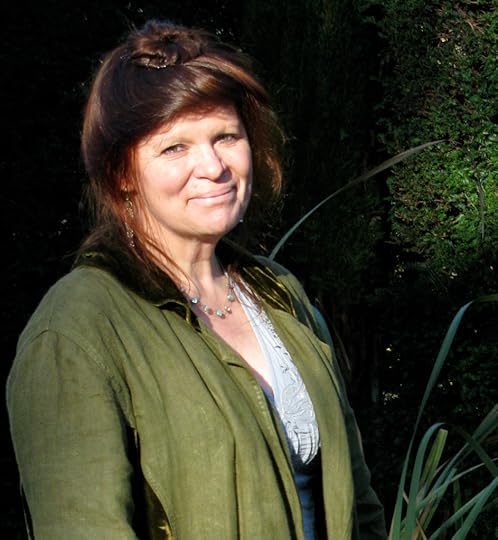 Juliet Greenwood
Juliet Greenwood
How many unfinished projects do you have on your computer?
More than I can count! And that’s without the exceedingly dire first attempts at books that I’m trying to root out and remove. One of the less dreadful is waiting in the wings to be revamped when the time is right, and the rest are being mined for any good ideas – while (hopefully!) leaving the ham-fisted execution behind.
Do you write a synopsis first or write the first chapter, or let the characters lead you?
I find I have to write the first three chapters before I attempt a synopsis. When I start a new book I generally have a clear idea of the main characters and where it is going, but I always find that when I start new characters come in, usually to resolve logistical problems. This is especially true for books set in the 1920s when social norms meant women couldn’t just move around as they wished, and being seen with a man could be social ruin. I find such characters appear from necessity, then refuse to remain in the position of convenient chaperone, ending up with a starring role of their own.
Were any of your characters inspired by real people?
I think they all are, even when I think they aren’t. Many of my female characters are inspired by the stories of real women, which have often been forgotten, such as those working under fire on the front line in WW1, like Rachel in ‘The Girl with the Silver Clasp’ and those who set up and ran hospitals and convalescent homes in private houses, like Miss Chesterfield in ‘The Ferryman’s Daughter’. When I look back at a book once it has been written, I often realise that most of my characters are amalgamations of aspects of myself and those I know. It’s a fascinating process.
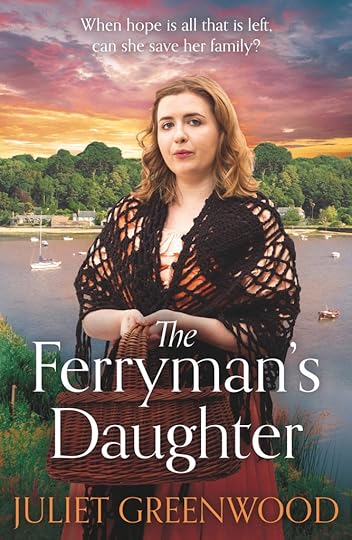
What did you learn when writing your book? In writing it, how much research did you do?
When I first set my books around the time of WW1, I had no idea just how much research was involved, but I’ve found it utterly fascinating. It made me realise just how much of women’s history, and particularly that of working class women, is simply ignored. It’s gradually being rediscovered, but there was so much I didn’t know, particularly just how independent and active women were in the past. I think the main thing I realised was just how much the suffrage movement achieved, with so many indomitable women dragging legal rights and protections for their sisters from unwilling politicians. I also, I’m ashamed to say, was unaware that the fight for the vote (like that for employment rights) was for men too, and that universal male suffrage was only achieved in the UK in 1928, on exactly the same day as for women. I’m glad I learnt that women might, until recently at least, be invisible to history, but that doesn’t mean they weren’t there, making their own lives and battling away, with many, like the amazing Millicent Fawcett, running rings around the most powerful men in the land.
What is your work schedule like when you’re writing?
I work my writing day around my freelance work as a proofreader and editor, which often has tight deadlines. I try and get that out of the way as early as possible. Then I clear my head by taking my dog for a walk. I live amongst the mountains of Snowdonia, in North Wales, so as well as enjoying the glorious scenery, it’s very peaceful (we give Snowdon a miss), so I see this as my thinking time. Once I’m back, the coffee is on and I plunge straight in before the dreaded procrastination sets in. I try and work solidly until the afternoon dog walk, which is much shorter, then settle down to reading, research and social media. In normal times, I break up the routine by meeting up with friends for coffee several times a week. One day soon …
Do you set yourself a daily word count?
I try and write at least 1000 words a day. If I’m feeling stuck, or the day job has frazzled the brain, I make sure I still write, even if it’s rubbish, as it keeps the mind on the story and inspiration does eventually appear, however unlikely it seems at the time.
 St Ives: The setting for Juliet’s books
St Ives: The setting for Juliet’s books
Did you ever consider writing under a pseudonym?
My career as a published writer started with short stories, serials and pocket novels using the pseudonym of ‘Heather Pardoe’. It was when I was just finding my feet and didn’t know in which direction I wanted to go, so I felt more comfortable doing them under another name. I also wasn’t very confident that my writing was any good, so meant I didn’t have to own up. I really enjoyed writing all of them, so I have definitely owned up since!
How long on average does it take you to write a book?
It takes about a year in all. I tend to write a (very) rough draft in about three months, so I know where I’m going. Then the hard work really begins…
Thank you for joining today, Juliet. If you would to find out more about Juliet’s books and writing please click the links below.
The Girl with the Silver Clasp:
Blog: http://julietgreenwoodauthor.wordpress.com/
Facebook: https://www.facebook.com/juliet.greenwood
Twitter: https://twitter.com/julietgreenwood
Instagram: https://www.instagram.com/julietgreenwood/
If you want to find out more about Clubhouse Member’s Books don’t forget to check out the Clubhouse Bookshops too.

